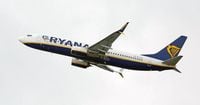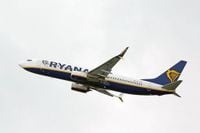DUBLIN (Reuters) - Ryanair has made history by flying 200.2 million passengers in its fiscal year ending March 2025, becoming the first European airline to achieve this milestone. This remarkable feat marks a significant increase in passenger numbers, with the airline reporting a 9% rise year-on-year, largely aligning with its earlier forecasts.
At the end of January 2025, Ryanair had projected that its annual traffic would reach almost 200 million, a target it successfully met and slightly exceeded. In March alone, the airline carried 15 million passengers, which is a 10% increase compared to the same month last year, demonstrating a robust demand for air travel.
Despite this success, Ryanair had to adjust its forecast for the upcoming year, reducing its expected passenger count from 210 million to 206 million. This revision marks the second time in three months that the airline has cut its forecast, primarily due to delays in aircraft deliveries from Boeing. The airline remains optimistic about its performance, but these delays pose challenges to its growth plans.
Ryanair's achievement underscores its position as Europe's largest airline by passenger numbers, highlighting the growing appetite for air travel across the continent. The low-cost carrier has consistently expanded its operations, benefiting from a rebound in travel demand following the pandemic.
In addition to Ryanair's impressive passenger figures, another significant development is unfolding in international trade. China has announced an extension of its anti-dumping investigation into European Union brandy by three months. This decision, reported by China's commerce ministry, provides EU exporters, particularly French cognac suppliers, with additional time to negotiate and potentially avert severe penalties that could impact their market access in China.
The investigation into EU brandy, which began earlier this year, has raised concerns among European producers who rely heavily on the Chinese market. French cognac, known for its quality and prestige, is particularly vulnerable to trade disputes, and the outcome of this investigation could have lasting effects on the industry.
As Ryanair continues to navigate the complexities of the aviation market, it faces different challenges than those confronting EU brandy exporters. Nonetheless, both sectors represent vital components of the European economy, with Ryanair's growth contributing to job creation and connectivity, while the outcome of the anti-dumping investigation could determine the future of a cherished European product.
Looking ahead, Ryanair's leadership remains committed to expanding its network and enhancing customer experiences, despite the hurdles posed by external factors such as aircraft delivery delays. The airline's ability to adapt and respond to market demands will be crucial as it aims to maintain its competitive edge in the fast-evolving aviation landscape.
Meanwhile, the extension of the anti-dumping investigation reflects the ongoing tensions in international trade, as countries grapple with issues of fair competition and market access. The EU's response to China's actions will be closely monitored, as it seeks to protect its interests while fostering positive trade relations.
In summary, Ryanair's landmark achievement of flying over 200 million passengers highlights the resilience of the airline industry in the face of challenges, while the ongoing trade investigations illustrate the complexities of global commerce. Both narratives are intertwined within the broader context of economic recovery and international relations, shaping the future landscape for European businesses.





